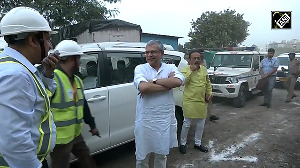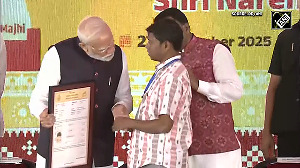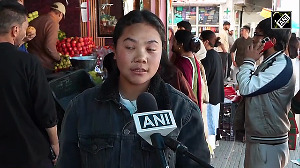Despite its deal, the Janata Dal-Secular doesn't look as if it wants to share power with the Bharatiya Janata Party.
B S Yediyurappa, the deputy chief minister of Karnataka, hopes he will have the chief minister's job on or after October 3.
'Hope' is the operative word here. For a vacancy to occur, current Chief Minister H D Kumaraswamy has to step down and hand the government over to the BJP as part of an arrangement that his party and the BJP entered into in 2006. Last week, Kumaraswamy said in Delhi that the BJP might be expecting too much if it thought he would tamely roll over and allow their 'communal designs' to come to fruition.
The background to the current crisis in Karnataka is this. The 2004 assembly elections threw up an assembly that was so badly hung, no single party could form the government. Of the 224 MLAs, the BJP had 75 seats, the Congress 65, JD-S 57 and others 27. In order to keep the BJP at bay, former prime minister and JD-S chief H D Deve Gowda agreed to support a Congress chief minister.
But it was a marriage made in hell. Finally, the Congress nominee Dharam Singh gave up when he was unable to work with the JD-S. That government fell in 2006, but Kumaraswamy, Gowda's son, did a deal with the BJP, promising them the chief ministership for the second part of the government's tenure. After much protestation and hand-wringing, Deve Gowda followed his son's lead. Now, it is Yediyurappa's turn to become chief minister. No one, absolutely no one, knows if this will happen.
Why should there be so much uncertainty over a process that ought to be seamless? The BJP is saying that as the single-largest party, there is no reason for it to be either apologetic or defensive about wanting its share in power. But relations between the JD-S and the BJP have not exactly been pleasant. Last week's incidents illustrate this.
As the leader of the party in government, Yediyurappa's role and personality haven't contributed to the smooth functioning of the relationship. Yediyurappa is a Lingayat, one of the best known and most politically influential castes in Karnataka and he does not hesitate in playing the Lingayat card to the hilt.
In the last budget that he presented, a generous contribution was made to some Lingayat mutts, something that had non-Lingayats in all parties howling. The last great Lingayat leader in Karnataka was Veerendra Patil who was sacked by Rajiv Gandhi, dealing a blow to the community's pride.
The Lingayats see, through Yediyurappa, a return of former glory. He has cut his political teeth in the BJP and was imprisoned during the Emergency. But he is not a man from whom you would want to learn how to win friends and influence people -- his people-management skills leave much to be desired.
If it is seniority that dictates succession, then it is Yediyurappa who should get the top job. But politics in the BJP is equally complex. Yediyurappa enjoys the support of the central high command -- BJP President Rajnath Singh had declared earlier this year that he would be the party's choice of chief minister. But that hasn't stopped MLAs from trying to see this doesn't happen.
A powerful faction in the BJP is headed by Member of Parliament Anantha Kumar. The supporters of the two leaders -- indeed, the two leaders themselves -- can't stand each other. In the end, rather like the emergence of Ramakrishna Hegde on the scene in the early 1980s, another BJP leader Jagadish Shettar might become the compromise candidate and walk away with the prize. But because the faction he heads is not so powerful, this could cause a split in the BJP.
Although the Congress has not shown its hand so far, there are two tendencies in the Karnataka unit. One, which is the most vocal -- and diabolical -- comprises all those who have worked with Deve Gowda and left him to join the Congress -- the likes of Siddaramiah, the powerful Kuruba (shepherd) leader; former Speaker of the Assembly Ramesh Kumar; D K Shivakumar and others.
This group would like Kumaraswamy to do a deal with Yediyurappa and run the government, so that the Congress can function as a legitimate opposition and cash in on anti-incumbency when assembly elections are held in 2009. Of course, as many in this group are Vokkaliga -- the caste that Deve Gowda belongs to, their desire to keep Gowda and sons at bay also springs from the need to protect their caste turf.
But there is another group that understands the dangers of a prolonged BJP-led government in Karnataka. Communal tensions, already sharp, could explode leading to deeper communalisation and more incidents like Mangalore and Chikmagalur. This group would prefer to do a deal with Gowda, maybe even have him instal his other son Revanna as chief minister (Kumaraswamy will leave the government if his brother becomes chief minister with Congress support), but keep the BJP out of power.
The Congress's central unit is giving no indication of its mind. Its "don't roil the waters" approach is amply demonstrated by its choice of general secretary to handle Karnataka affairs. M M Jacob, former Governor of Meghalaya, may be a veteran Congressman but he has been out of active politics for more than a decade.
This much is clear. If all goes according to plan and Yediyurappa does become chief minister, Gowda will unseat him in a matter of months. For all you know, assembly elections in Karnataka could be advanced. And you know, that might not be a bad thing.





